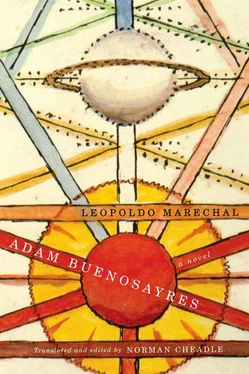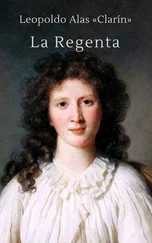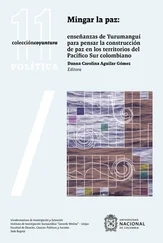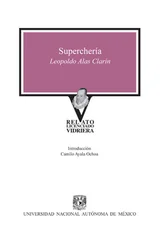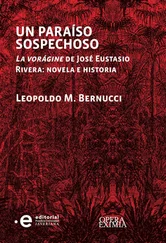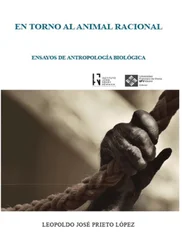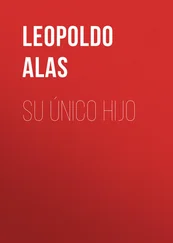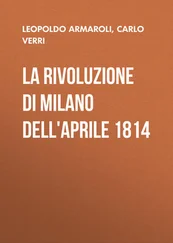Fogwill, Rodolfo Enrique. Vivir afuera . Buenos Aires: Sudamericana, 1998.
Fontán, Gustavo, dir. El canto del cisne . 1994. Film.
— dir. Marechal, o la batalla de los ángeles . Fundación Leopoldo Marechal, 2002. Film.
Franco, Ernesto. Trans. Jeremy Parzen. “Buenos Aires: Adán Buenosayres , Leopoldo Marechal, 1948.” In Franco Moretti, ed. The Novel . 693–9.
Galasso, Norberto. La búsqueda de la Identidad Nacional en Jorge Luis Borges y Raúl Scalabrini Ortiz . Rosario, Argentina: Homo Sapiens, 1998.
Gamboa, Santiago. El síndrome de Ulises . Bogotá: Planeta, 2005.
Gobello, José. Letras de tango , vols. 1–3. Buenos Aires: MERALMA, 1997.
— Nuevo diccionario lunfardo . Buenos Aires: Corregidor, 1999.
González Lanuza, Eduardo. Review of Adán Buenosayres (1948) by Leopoldo Marechal. Sur 169 (1948): 87–93.
Gordon, Ambrose. “Dublin and Buenos Aires, Joyce and Marechal.” Comparative Literature Studies 19.2 (1982): 208–19.
Gorelik, Adrián. Miradas sobre Buenos Aires: Historia cultural y crítica urbana . Buenos Aires: Siglo Veintiuno, 2004.
Guénon, René. 1925. L’ésoterisme de Dante . Paris: Gallimard, 1957.
— The Symbolism of the Cross . 1931. Trans. Angus Mcnab. London: Luzac, 1975.
Jacchia, Nicola, trans. Adán Buenosayres . By Leopoldo Marechal. Ed. Claudio Ongaro. Florence: Vallechi, 2010.
Jitrik, Noé. “ Adán Buenosayres , la novela de Leopoldo Marechal.” Contorno 5–6 (1985): 38–45.
Joyce, James. Ulysses . London: Bodley Head, 1960.
Kahn, Máximo José. “Los antijudíos filosemitas.” Sur 160 (1948): 48–57.
Keyserling, Hermann. South American Meditations . Trans. Theresa Duerr. New York and London: Harper, 1932.
King, John. Sur: A Study of the Argentine Literary Journal and its Role in the Development of a Culture, 1931–1970 . London: Cambridge University Press, 1986.
Lafforgue, Jorge. “Hacia el Adán Buenosayres.” Leopoldo Marechal. Obras completas, III: Las novelas . Buenos Aires: Perfil, 1998. ix — xv.
— Estudio filológico preliminar. Adán Buenosayres . Coord. Jorge Lafforgue and Fernando Colla. Colección Archivos 31. Madrid: Unesco, 1997. xxii — xxxix.
Lafforgue, Martín, ed. Anti-Borges . Barcelona: Javier Vergara, 1999.
Lange, Norah. Estimados congéneres . Buenos Aires: Losada, 1968.
Lindstrom, Naomi. “El utopismo lingüístico en Poema de Xul Solar.” Texto Crítico 24–5 (1982): 242–55.
Lojo, María Rosa. Las libres del Sur: Una novela sobre Victoria Ocampo . Buenos Aires: Sudamericana, 2004.
— Los “gallegos” en el imaginario argentino . A Coruña: Fundación Barrié de la Maza, 2008.
Limami, Abdellatif. Espace urbain dans le roman latino-americain contemporain (le cas argentin: Leopoldo Marechal, Roberto Arlt et Ernesto Sábato) . Thèse de doctorat (Lettres). Université de Toulouse-Le Mirail, 1990.
Lugones, Leopoldo. El payador . 1916. Buenos Aires: Centurión, 1961.
Mallea, Eduardo. Historia de una pasión argentina . 1937. Obras completas . Buenos Aires: Emecé, 1961. 305–438.
Marechal, Leopoldo. Obras completas , 5 vols. Buenos Aires: Perfil, 1998.
— El Banquete de Severo Arcángelo . 1965. 9th ed. Buenos Aires: Sudamericana, 1985.
– “Autobiografía de un novelista.” Public lecture, 19 Sept. 1969. Transcription José E. Clemente. Proa, Edición Especial “Los cien años de Leopoldo Marechal” (Sept/Oct 2000): 61–71.
– “Carta a Eduardo Mallea.” Sol y Luna 1 (1938): 180–2. Reproduced in Obras completas , vol. 5. 289–91.
– “Las claves de Adán Buenosayres.” L. Marechal et al. Las claves de Adán Buenosayres . Mendoza: Azor, 1966. 7–22.
— Cuaderno de navegación . Buenos Aires: Sudamericana, 1966.
– “Victoria Ocampo y la literatura femenina.” Sur 52 (Jan. 1939): 66–70. Reproduced in Obras completas , vol. 5. 293–7.
— Vida de Santa Rosa de Lima . 1943. Obras completas , vol. 2. 367–41.
Marechal, María de los Ángeles. “Cronología de Leopoldo Marechal.” Proa, Edición Especial “Los cien años de Leopoldo Marechal” (Sept/Oct 2000): 123–8.
Mármol, José. Amalia . Mexico: Porrúa, 1971.
Martin, Gerald. Journeys through the Labyrinth: Latin American Fiction in the Twentieth Century . London and New York: Verso, 1989.
Martínez Pérsico, Marisa. Leopoldo Marechal: Entre la cuerda poética y la cuerda humorística . Città di Castello, Italy: Edizioni Nuova Prhomos, 2013.
Moretti, Franco, ed. The Novel, Volume 2: Forms and Themes . Princeton, New Jersey: Princeton University Press, 2006.
Moya, José C. “The Positive Side of Stereotypes: Jewish Anarchists in Early-Twentieth-Century Buenos Aires.” Jewish History 18.1 (2004): 19–48.
Navascués, Javier de. Adán Buenosayres : una novela total. Estudio narratológico . Pamplona: Ediciones Universidad de Navarra, 1992.
– “Cartografías míticas: Borges y Marechal.” Maria Luisa Molteni y Laura Scarabelli, eds. Los ojos en la ciudad . Milán: Arcipielago, 2009. 105–18.
– “Marechal frente a Joyce y Cortázar.” Cuadernos Hispanoamericanos 538 (1995): 45–56.
Navascués, Javier de, ed. Adán Buenosayres by Leopoldo Marechal. Critical edition. Buenos Aires: Corregidor, 2013.
Nicholson, Melanie. Evil, Madness, and the Occult in Argentine Poetry . Gainesville: University Press of Florida, 2002.
Ojeda Bär, Ana and Rocco Carbone. Estudio preliminar. Enrique González Tuñón: Narrativa 1920–1930 . Buenos Aires: El 8vo. Loco, 2006. 9–30.
Ongaro, Claudio, ed. Adán Buenosayres . By Leopoldo Marechal. Trans. Nicola Jacchia. Florence: Vallechi, 2010.
Ortega y Gasset, José. Obras completas . Vol. 2: El Espectador (1916–1934). Madrid: Revista de Occidente, 1946.
Ortiz, Fernando. La música afrocubana . Madrid: Júcar, 1975.
Paffenroth, Kim. Judas: Images of the Lost Disciple . Louisville, Kentucky: Westminster John Knox Press, 2001.
Paz, Octavio. The Double Flame: Love and Eroticism . Trans. Helen Lane. New York: Harcourt, 1995. Original: La llama doble: amor y erotismo . Barcelona: Seix Barral, 1993.
Piglia, Ricardo. “Ficción y política en la literatura argentina.” Karl Kohut and Andrea Pagni, eds. Literatura argentina hoy: De la dictadura a la democracia . Frankfurt: Vervuert, 1989. 97–103.
– “Notas al margen de un ejemplar de Adán Buenosayres .” Leopoldo Marechal. Adán Buenosayres . Ed. Jorge Lafforgue y Fernando Colla. 2 aed. Colección Archivos 31. Madrid: Galaxia Gutenberg, 1999. xv — xviii.
Pino, Diego A. del. “Mitos y leyendas en el barrio de Villa Crespo.” Jorge M. Boullosa, et al. Mito y leyendas , vol. 1. Buenos Aires: Ediciones Turísticas, 2005. 87–96.
Piñeiro, Alberto Gabriel. “Mitos y leyendas en el barrio de Saavedra.” Jorge M. Boullosa, et al. Mito y leyendas , vol. 1. Buenos Aires: Ediciones Turísticas, 2005. 69–85.
Prieto, Adolfo. El discurso criollista en la formación de la Argentina moderna . 1988. Buenos Aires: Siglo veintiuno, 2008.
– “Los dos mundos de Adán Buenosayres .” Leopoldo Marechal et al. Las claves de Adán Buenosayres . Mendoza, Argentina: Azor, 1966. 31–50.
Читать дальше
